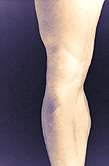(HealthDay)—For obese individuals, a novel, biomechanical, home-based gait-training device is associated with improvements in gait parameters at three and 12 months, according to a study published online July 28 in the International Journal of Rheumatic Diseases.
Omri Lubovsky, M.D., from Barzilay Medical Center in Ashkelon, Israel, and colleagues examined the effect of a gait-training device on gait patterns in a retrospective analysis. Data were included from 105 obese subjects (32 males, 73 females) with knee osteoarthritis who completed a 12-month program.
The researchers observed significant improvement in each of the gait parameters at three months, and further improvement at 12 months (P = 0.03 overall). At three and 12 months, gait velocity increased by 11.8 and 16.1 percent, respectively, while single-limb support of the more symptomatic knee increased by 2.5 and 3.6 percent, respectively. Pain, stiffness, and functional limitations were reduced at three months (each P < 0.001); these improved further at 12 months. Pain decreased by 34.7 and 45.7 percent, respectively, while functional limitation decreased by 35.0 and 44.7 percent, respectively. Significant improvements were seen in the Physical and Mental Scales of the Short Form-36 (P < 0.001) at three months, with greater improvements seen at 12 months.
"The study participants reported relief in pain and showed significant improvement in gait pattern after following the combined device and exercise program for 12 months," the authors write.
Several authors disclosed financial ties to AposTherapy.
More information:
Abstract
Full Text (subscription or payment may be required)
Copyright © 2015 HealthDay. All rights reserved.
























